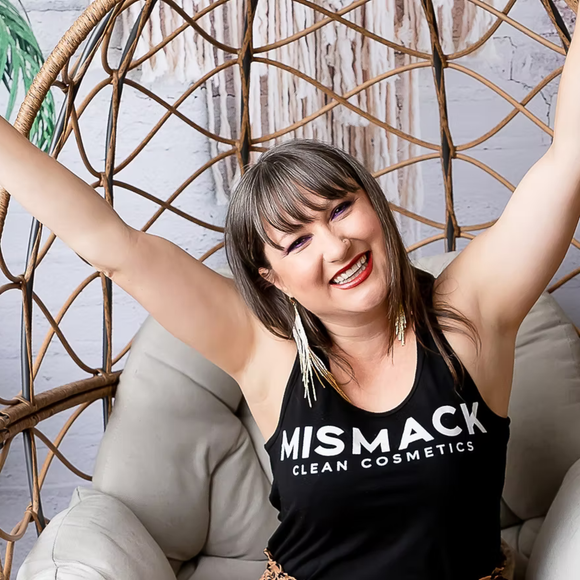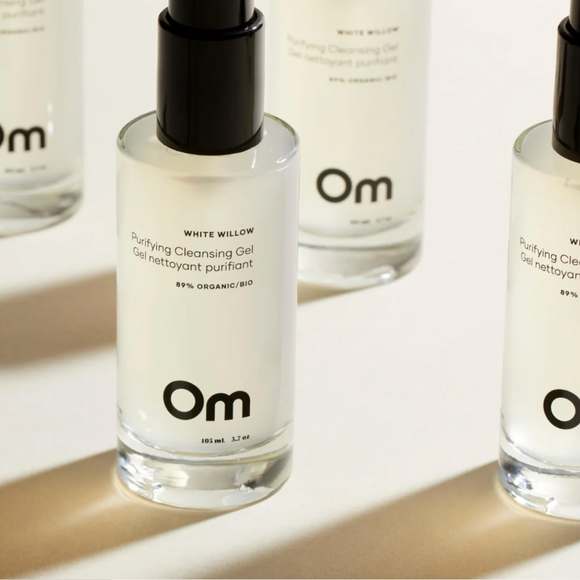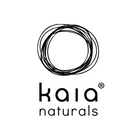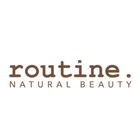
the truth about sun protection
Sun protection: it’s a hot topic. We constantly hear about how important sunscreen is and how often to reapply, but that barely scratches the topic's surface.
can sunscreen be more damaging than beneficial?
Applying sunscreen protects our healthy cells from sun damage caused by harsh UV rays. Sun damage can result in accelerated aging, skin wrinkling, melasma, hyperpigmentation and even lead to skin cancer.
When sun protection is achieved by applying endocrine-disruptive, and allergy-inducing ingredients such as oxybenzone, octinoxate, homosalate, avobenzone, multiple times a day for years on end, the sunscreen could cause as much damage to our health as the benefits we receive - not to mention the consequences on aquatic life.
Fortunately, sun protection can be holistic, healthy, and synergistic while still delivering protection with ease and harmony.
3-steps for glowing, sun-ready skin
1 - spf sunscreens
Mineral sunscreens (made with zinc oxide and titanium dioxide) are gaining notoriety due to their safety and effectiveness. When combined in a stable cream formula, zinc oxide and titanium dioxide are non-disruptive and don’t penetrate the skin as chemical sunscreens do, yet still leave us protected. Both minerals block and scatter UVA and UVB rays (providing broad-spectrum protection) more efficiently than chemical sunscreens and create an invisible physical shield, so we can feel extra safe having fun under the sun.
how to apply sunscreen for best results?
Because of their mineral bases, they are white in appearance out of the bottle, and when applied correctly, will leave no undesirable white cast. For best results, apply your sunscreen soon after your skincare or body care products, spreading and patting into the skin. This method not only makes application easier but also creates an even application and stronger “shield”.
facial sunscreens
- simple, everyday sun protection without a white cast Tinted SPF 30 Sunscreen
- nourishing, creamy, unscented tinted spf in two shades Daily Defence Tinted SPF 30
- great for the face and body! Moisturizing Mineral SPF 50 and Moisturizing Mineral SPF 30
body sunscreens
- water resistant, high performance SPF 40 Sport Adult and SPF 40 Sport Kids
- protech broad spectrum for sensitive skin SPF 50 Protech Adult and SPF 50 Protech Kids
- great for the face and body! Moisturizing Mineral SPF 50 and Moisturizing Mineral SPF 30
- easy to apply, hypoallergenic SPF 27 Spray Sunscreen Adult and SPF 27 Spray Sunscreen Kids
- rich, buttery, and easy! All Natural Mineral SPF 30
- balm SPF that melts into the skin Unscented SPF 30 and Lavender SPF 30
2 - protection-boosting skincare
Although they are no replacement for SPF sunscreen, specific ingredients can contribute to naturally boosting your skin's ability to withstand the sun by boosting its natural barriers. Using them under SPF sunscreen daily can help to significantly prevent premature aging, burns, and long-term damage. And, since sun damage can cause collagen breakdown, be sure to use vitamin C and collagen-boosting actives at night!
the must-have summer skincare ingredients:
Look for ingredients rich in antioxidants, omega fatty acids, and vitamins like raspberry seed oil, pomegranate seed oil, avocado oil, coconut oil, sea buckthorn oil, shea butter, aloe vera, astaxanthin, vitamin e (tocopherols), beta carotene and lycopene. Some of these ingredients are thought to have SPF equivalent ratings ranging from 5-28!
skin mists: Pink Coconut Hydrating Face Mist · Face Food Mineral Mist
serums: Antidote H+ Hydrating Serum · Nordic Boost Hydrating Serum
moisturizers: Botanical Beauty Elixir · Grenadine–Day Antioxidant Facial Cocktail
night treatments: Turmeric Night Cocoon · Overnight Watermelon Mask · Renewing Nightly Moisturizer
3 - edible sunscreen
Feeding ourselves to promote sun protection helps to prevent cell damage and promote vibrance to our entire bodies. Skin health is closely tied to our inner health, after all. Loading up on antioxidants like vitamin C, vitamin E, lycopene, beta carotene found in colourful fruits and veggies can help our bodies to filter UV rays, protect the skin and eyes, and combat the increased cell damage we experience from the sun. Healthy fats from avocados and seeds and beverages that are rich in flavonoids like green tea will help to strengthen inner defences as well, and are delicious to enjoy. During a long day in the sun, cravings for sweeter and more hydrating fruits may hit as our bodies want to replenish themselves, so be sure to indulge in these intuitive cravings!
edible sunscreen shopping list:
Tomatoes, watermelon and grapefruit: excellent source of lycopene - protects against sun burns
Sweet Potato, spinach, carrots, kale, mangoes, and cantalope: rich in beta carotene, cartenoids, helps decrease redness in skin when it is exposed to UV light.
Berries, grapes and pomegranates: these fruits offer sun-protective polyphenols
Flax, hemp and chia seeds, and walnuts: These plant-based omega-3s are important to prevent moisture loss from cells, which keeps skin supple, and they are a source of the skin protective antioxidant vitamin E.
Sipping green & other flavonoid-rice tea, dark chocolate, cocoa or coffee may help protect from melanoma and even skin cancer.
Resources
EWG - The trouble with ingredients in sunscreen
Health Canada - Ultraviolet radiation
Skin Cancer Foundation - UV Radiation & Your Skin
Just Sun - 5 Reasons you need to wear sunscreen everyday
Photo: @justsunproducts (IG)


















